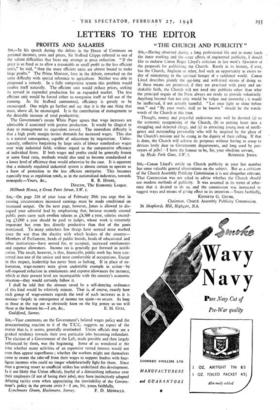LETTERS TO THE EDITOR
PROFITS AND SALARIES
Sm,—In his speech during the debate in the House of Commons on personal incomes, costs and prices, Sir Stafford Cripps referred to one of the salient difficulties that faces any attempt at price reduction. " If the price is so fixed as to allow a reasonable or small profit to the less efficient units," he said, " then the more efficient units are almost bound to make large profits." The Prime Minister, later in the debate, remarked on the same difficulty with special reference to agriculture. Neither was able to propound a remedy. In a fully competitive system this problem would resolve itself naturally. The efficient unit would reduce prices, seeking its reward in expanded production for an expanded market. The less efficient unit would be forced either to reorganise itself or fall out of the running. As Sir Stafford commented, efficiency is greatly to be encouraged. One might go further and say that it is the one thing that must, above all, be encouraged. It is the contribution of management to the desirable increase of total productivity.
The Government's recent White Paper agrees that wage increases are admissible if associated with greater production. It would be illogical to deny to management its equivalent reward. The immediate difficulty is that a high profit margin invites demands for increased wages. This also is a natural consequence, capable of adjustment by negotiation. Unfor- tunately, collective bargaining by large units of labour standardises wages over wide industrial fields without regard to the comparative efficiency of individual firms. If both wages and profits could be generally frozen at some fixed ratio, methods would also tend to become standardised at a lower level of efficiency than would otherwise be the case. It is apparent that a minutely regulated industrial system is almost certain to operate as a form of protection to the less efficient enterprise. This becomes especially true as regulation tends, as in the nationalised industries, towards Director, The Economic League.
Milibank House, 2 Great Peter Street, S.W. i.


































 Previous page
Previous page